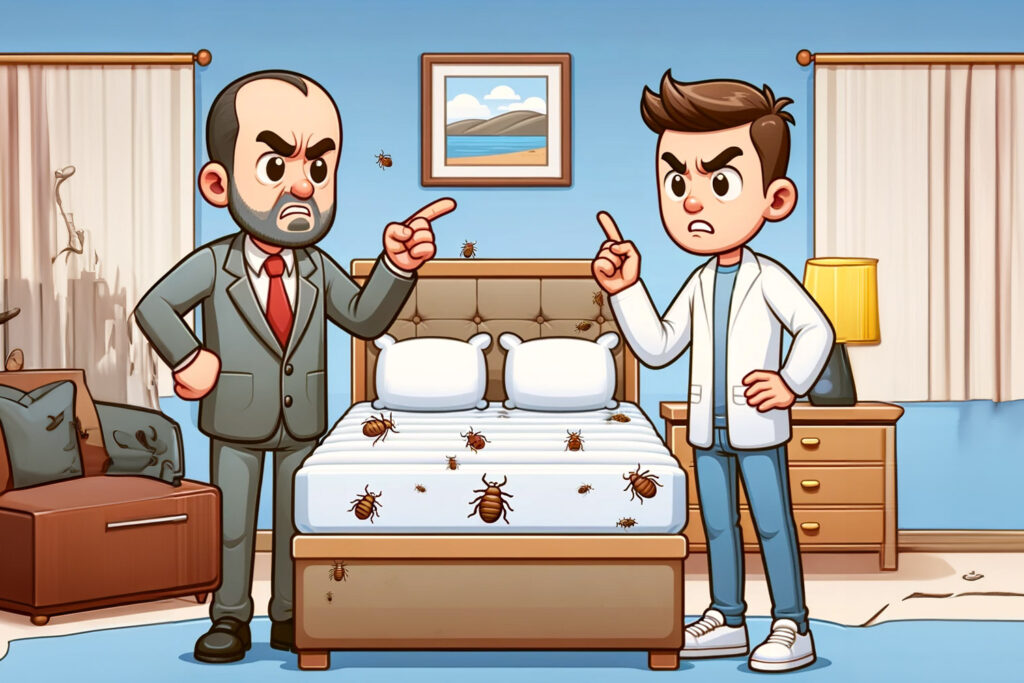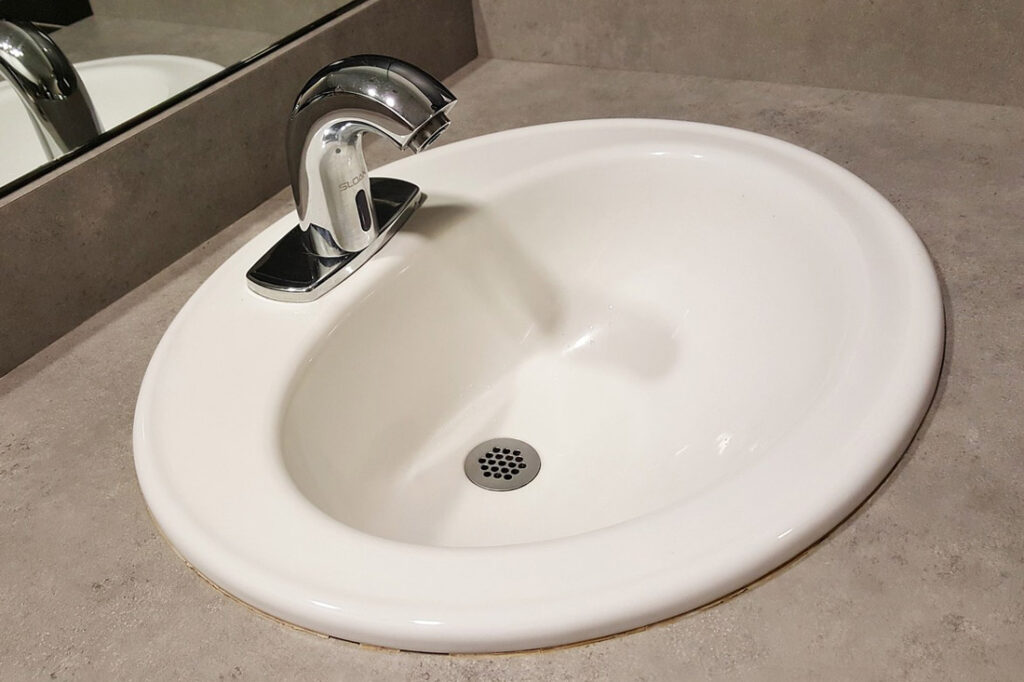Get Immediate Pest Control Help -
1-877-393-3401
Anytime you notice signs of a pest infestation, the sooner you act to address it, the easier it will be to solve the problem. However, if you're a landlord or a renter, you know that effective pest control isn’t free, and you may be wondering who will be responsible for footing the bill when issues like this arise.
In most states, both the landlord and the tenant have obligations in this regard, but it isn’t always clear who is responsible. The ultimate answer depends on a few factors, such as the state where you live and the laws there, the terms of your lease agreement, and the actions that have been taken by the tenant and landlord.
Landlord Responsibilities

Landlords have a lot of responsibilities when it comes to managing a rental property. Some of these are outlined by state law while others can vary depending on the details of your lease. When it comes to pest control, the landlord is the party most responsible for keeping the property free from pests. Obligations can include paying for treatment when issues come up and ensuring preventative measures are in place for known issues. Landlords are also responsible for making sure your home is pest-free before you move in.
Landlords should be proactive when it comes to maintenance and only work with the best pest control companies to inspect their properties and use preventative treatments whenever possible. Working with a professional can also help landlords plan and budget by answering questions like, how much does pest control cost? What are the most effective ways to prevent pests in an apartment building? And how long can I expect pest control treatments to last?
Get Immediate Pest Control Help -
1-877-393-3401
However, there are times when it wouldn't be solely the landlord’s responsibility. For instance, a tenant’s job is to keep the property cleaned and maintained, and if they fail to do this and their neglect results in an infestation, they could be the one financially responsible for the pest control costs. Also, any special requests like using pet-friendly ant killer instead regular ant killer would be the tenant's responsibility.
Implied Warranty of Habitability
One legal term that both landlords and tenants should be familiar with is called “implied warranty of habitability.” Essentially, this principle states that it’s the landlord’s job to ensure the rental property is safe and habitable, ie. livable.
This can include a host of responsibilities like ensuring there’s a functioning heating and cooling system, that all the plumbing is in working order, installing working smoke and carbon monoxide detectors, making any needed repairs promptly, and staying in compliance with all state and county housing codes. Another responsibility that falls under this legal doctrine is pest control.
Currently, all states in the country have this law on the books except for Arkansas, though several unsuccessful efforts have been made by state legislators to get a new law passed to include it. States are also allowed to write laws regarding landlord responsibilities and pest infestation that can supplement the implied warranty of habitability.
Get Immediate Pest Control Help -
1-877-393-3401
Importantly, the tenant also plays a key role in this law’s enforceability so the burden doesn’t fall entirely on the landlord. As the tenant, you must notify your landlord in writing that you’ve observed signs of an infestation. If your landlord fails to respond to this notice within a prescribed set of time, they could be in violation of the law.
Tenant Responsibilities

Landlords aren’t the only ones with important responsibilities when it comes to renting and managing a home – the tenant also has several obligations including maintaining the home and notifying the landlord in a timely manner of any issues that come up.
The biggest thing tenants can do to keep their rental home pest-free is to keep it clean. This includes taking out the trash regularly, cleaning up food scraps left in the kitchen, properly storing food so pests aren’t attracted to it, and using flea treatments on any pets living in the home. A consistently dirty house that draws pests is one of the biggest reasons why a tenant may have to bear the financial responsibility of pest control rather than the landlord.
Tenants also must report and document issues promptly and give their landlords plenty of time to research and address the problem (though how long this varies by state). This means tenants have to provide written notice of any issues that arise, include pictures or videos that document the problem, and allow the landlord access to the property so they can take care of it.
In many cases, this can be done via email or text, but it’s always a good idea to check your lease or with your landlord to see if they require a notice by mail. If it’s discovered that you knew about the problem and allowed it to get worse without mentioning anything to your landlord, you’ll likely be on the hook for some or all of the pest control costs.
Common Questions

If my apartment has roaches can I break my lease?
Breaking a lease is a big step and one that can result in legal and financial trouble if done incorrectly. However, in some cases, it may be necessary if your home is uninhabitable and unsafe to live in due to pests. If you are thinking about breaking your lease due to roaches, make sure you thoroughly review your lease agreement and ensure you’re in complete compliance.
This often means that you’ve kept your home clean, as well as following other pest control tips like using air-tight containers for your food and reporting any leaks or damage. You must give your landlord written notice of the problem and then allow them a reasonable amount of time for them to address it. In most states, you will also have to provide a written notice that you intend to move. You may also wish to file a complaint with the city or county health department to cover all your bases. Whatever you do, make sure you document everything.
How long does a landlord have to get rid of roaches?
The amount of time a landlord has to deal with a cockroach infestation (or any pest) will vary from state to state. For instance, landlords in New York have 21 days to address a roach problem whereas California allows landlords 30 days to deal with an insect infestation.
Is my landlord responsible for bed bugs?
In almost all cases, a landlord will be responsible for treating bed bugs unless they can clearly prove it was the tenant that created the problem. This is because bed bugs are rarely caused by a tenant’s actions and if you live in an apartment complex, bed bugs can move between the walls and it can be nearly impossible to pinpoint what unit the infestation started in. Almost all states would deem a bed bug infestation as unlivable, and it would therefore be covered under the implied warranty of habitability.
Are landlords responsible for cockroaches?
Cockroach infestations will generally fall under the protection of the implied warranty of habitability because a roach-infested home can be deemed unlivable. So, broadly speaking, it would be the landlord’s responsibility to deal with cockroaches in a rental unit. That said, although many large cities have large roach populations, they’re largely drawn to areas of the home where there's a lot of food waste lying around and this falls to the tenant to keep clean. If the landlord can prove that the tenant hasn’t been keeping the home clean which in turn attracted roaches, then they would not be responsible.
Are landlords responsible for pest control in PA?
Pennsylvania is one of the many states that upholds the implied warranty of habitability law. However, there are no additional state laws that outline regulations about pest control in rental properties which could make the implied warranty harder to enforce. Because of this, both tenants and landlords should pay particular attention to the details of their lease and ensure pest control measures are clearly outlined.
Are landlords responsible for pest control in Indiana?
Indiana also complies with the implied warranty of habitability law, but other aspects of the state law can be vague about pest control, so most questions about responsibility will come down to the terms of your lease. Per state law, landlords must keep common areas clean and safe and complete needed repairs in a timely manner, and tenants must keep their homes clean and safe.
Are landlords responsible for pest control in Missouri?
Missouri law states that landlords are responsible for maintaining habitable properties for their tenants, performing regular maintenance, and ensuring the rental units are pest-free; however, tenants are responsible for day-to-day cleanliness and maintenance which implies a shared responsibility for pest control.
Are landlords responsible for pest control in Michigan?
Like many states, Michigan laws surrounding pest control in rental units can be a bit ambiguous. There are state regulations that address bed bugs declaring it’s the landlord's responsibility to keep the “building free from vermin,” but this doesn’t specifically extend to other types of pests. As with any question of landlord/tenant responsibilities, you should refer to your lease for an exact answer.
Who Pays for Pest Control?
No tenant wants to live in a home with pests, just like no landlord wants the added expenses of pest infestation treatment. In an ideal world, both parties work together to make sure this doesn’t happen, and if it does, it’s taken care of right away.
If your lease doesn’t already include one, you should ask to add a pest control clause to your agreement since many states don’t have clear laws on the issue. This can help both the tenant and the landlord to clearly define responsibilities and obligations regarding pests.
Get Immediate Pest Control Help -
1-877-393-3401






